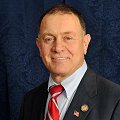- By Renée Gamela
- News
 Print
Print  Washington, D.C. – U.S. Rep. Richard Hanna tonight voted in favor of legislation that aims to stem the rising unemployment rate among the nation’s veterans.
Washington, D.C. – U.S. Rep. Richard Hanna tonight voted in favor of legislation that aims to stem the rising unemployment rate among the nation’s veterans.Hanna voted ‘yes’ on H.R. 2433 the Veteran Opportunity to Work (VOW) Act of 2011, legislation that he co-sponsored. The bill incorporates education, training, protections and eliminations in the system to provide veterans with the opportunity to compete in a 21st century economy.
The bill’s author, U.S. Rep. Jeff Miller, chairman of the House Committee on Veterans Affairs, aims to get the vet unemployment rate below 5 percent over the next two years. The unemployment rate among veterans is nearly twice that of the national average.
“As a nation, we should ensure our veterans receive the skills necessary to market themselves in the workforce,” Hanna said. “These young men and women commit to defend our nation and we can commit to seeing they have every opportunity to find a job when they return home.”
Among the bill’s highlights:
- Transition Assistance Program: TAP will be mandatory for all service members in all branches of the armed forces. Currently the United State Marine Corps is the only branch where TAP is mandatory. TAP provides classes for separating members to learn how to write a resume and other skills to help them prepare for civilian life and entering the civilian job market upon separation.
- Education and training: This bill will allow up to one year for unemployed veterans to receive Montgomery GI Bill benefits to retrain and acquire new jobs skills to better compete in the global economy.
- National Guard and Reserve members: This bill also seeks to strengthen job protections for returning National Guardsmen and Reserve members by reinforcing the Uniformed Services Employment and Reemployment Rights Act (USERRA), which requires employers to re-hire previously employed reserve members who were activated and deployed.
- Transition to Civilian Employment: The VOW Act also seeks to ease licensing and certifications for vets who had certain jobs in the military in states with burdensome regulations, preventing qualified vets from being hired in such parts of the workforce. The VOW Act will work with the Department of Labor and the states to identify such roadblocks to employment.
The VOW Act passed the House by a vote of 418 – 6.
v7i40



